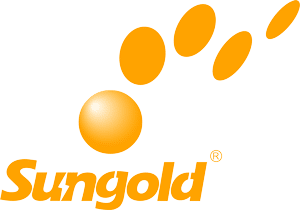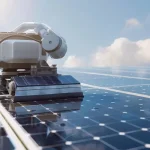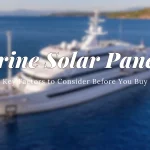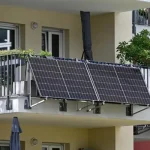Table of Contents
The Chinese solar panel market is booming, with the new installed capacity in 2023 being double that of the combined totals of the United States and the European Union. As the world’s largest producer of solar modules, China accounts for over 80% of the global manufacturing capacity. According to Wood Mackenzie, China is expected to supply more than half of the world’s electricity by 2050. With its cost advantages, China’s solar modules cost only $0.15 per watt, significantly lower than those in India, Europe, and the United States.
However, finding a reliable solar panel manufacturer can be challenging. Sungold shares key factors to consider when selecting high-quality solar panels, including understanding the main parameters, identifying quality components, effective communication, and staying informed about the latest photovoltaic market trends.
Keep reading this article to lead your local photovoltaic market with Sungold. Ultimate Guide To Buying Solar Panels From China
Four Reasons to Import Solar Panels from Chinese PV Manufacturers
Comprehensive Supply Chain – Low Cost, High Efficiency, Stability
China’s manufacturing advantage goes beyond just low labor costs. In fact, China has the world’s most comprehensive industrial system, especially in the photovoltaic (PV) industry. In China, you can find suppliers for almost any solar product and accessory. The key components of a PV system include solar panel modules, storage batteries, wires, PV inverters, and mounting brackets. Specifically, the main materials for solar panels include solar cell chips, PVC materials, solder, tempered glass, and automated assembly machines for solar modules. Therefore, China’s complete supply chain system, solid infrastructure, and highly skilled workforce can provide global customers with low-cost, efficient, and stable products.
Economies of Scale - High Capacity
An analysis of the annual export value of Chinese solar panels in USD shows that by 2022, China’s solar panel production had reached 1.4 trillion yuan, accounting for over 80% of the global solar product capacity. This indicates that Chinese PV manufacturers have achieved economies of scale, allowing them to benefit from the cost advantages brought about by mass production. For example, as of December 2023, the cost of solar modules in China was $0.15 per watt, significantly lower than in India ($0.22 per watt), Europe ($0.30 per watt), and the United States ($0.40 per watt). This means that Chinese-made components are 50% cheaper than those made in Europe and 62.5% cheaper than those made in the United States.
Faster Turnaround Times
Chinese PV manufacturers serve numerous international clients and can offer excellent turnaround times. This efficiency is largely due to the experience gained from working with international clients and understanding their processes. Additionally, many solar panel manufacturers have achieved economies of scale in PV production, further enhancing their ability to deliver on time.
Technological Advantages in China’s Photovoltaic Manufacturing
Globally, China’s technological prowess has shown strong competitiveness, especially in key technologies for solar panels, such as PV chips and automated manufacturing systems for solar modules. Particularly in solar chip technology, many industry leaders continuously upgrade and innovate their product lines. Since 2023, several manufacturers have introduced a new generation of N-type solar chips.
Solar Panel Production Bases In China
In China’s solar industry landscape, the primary production bases for solar panels and components are concentrated in Guangdong, Zhejiang, and Jiangsu provinces. Particularly, Jiangsu and Zhejiang provinces are home to factories specializing in the production of high-power solar modules, such as 400W, 450W, 500W, and higher wattage panels. These components, known for their high efficiency and capability to support large solar projects, have become highly sought after in the market in 2024.
Meanwhile, Guangdong province is a major hub for the production of low-power solar panels. These panels are suitable for RVs, marine applications, and small portable solar systems. For example, solar panels commonly used in RV power systems have a power rating of around 100W and often need to be custom-sized for specific uses. Leading flexible module manufacturers like Sungold have attracted numerous large manufacturers to enter this niche market.
At the other end of the supply chain, key component suppliers, such as those producing solar chips, are primarily located in inland provinces like Sichuan. These regions offer lower factory and labor costs compared to coastal areas, providing ideal conditions for manufacturing critical solar panel components.
The geographical distribution of China’s solar panel manufacturing industry showcases its comprehensive production strategy. Whether designing high-power panels for large solar power stations or small panels for street lighting or portable applications, China’s diverse manufacturing environment can meet a wide range of solar needs. Additionally, the strategic placement of component suppliers in cost-effective regions ensures that the Chinese solar industry remains competitive in the international market while delivering high-quality products.
Three Ways To Find Chinese Solar Panel Manufacturers
For businesses looking to procure high-quality solar panels at competitive prices, finding the right solar panel manufacturer is crucial. Here are three effective methods to discover and connect with Chinese solar panel manufacturers:
Visit Trade Shows in China
Attending trade shows is one of the most effective ways to find manufacturers of solar panels or other products in China. The Canton Fair is the most well-known comprehensive trade show, suitable for those interested in various products. If you are focused on the photovoltaic (PV) sector, you should attend specialized trade shows dedicated to the energy and PV industries. Key industry events include the Guangzhou International Solar Photovoltaic & Energy Storage Industry Expo, the International Green Energy Expo (IPEE), and the SNEC PV Power Expo in Shanghai.
Browse Official Websites of Chinese PV Factories
Not all business owners have the time or need to attend trade shows. For small business owners, retailers, and online store operators, searching for Chinese PV suppliers on Google might be a more convenient option. Additionally, China has many B2B platforms like Alibaba and ENF that can help you find reliable and scalable solar panel manufacturers. Through factory websites, you can clearly see the actual equipment, factory environment, and years of manufacturing experience, which can help in making an informed decision.
Follow Chinese Solar Panel Manufacturers on Social Media
Social media is a great way to find and verify Chinese PV manufacturers. However, it is advised not to rely solely on social media for evaluating suppliers. Instead, combine it with the above methods. Platforms like Facebook, LinkedIn, and Twitter can be used to read reviews and get insights from other users about these suppliers.
Check Advertisers on Google Search Engine
Typically, solar PV manufacturers willing to invest in search ads tend to have strong financial capabilities, which can indicate their stability to some extent.
By using these methods, you can effectively discover and connect with reputable solar panel manufacturers in China, ensuring a reliable and competitive supply for your business needs.
Key Parameters To Know When Buying Solar Panels
When purchasing solar panels, understanding the technical specifications provided by suppliers is crucial. These specifications are not just numbers; they are the standards by which the quality of solar panels and their compatibility with your solar system are measured. Let’s take a 110W flexible solar panel as an example to focus on some of the most critical technical parameters:
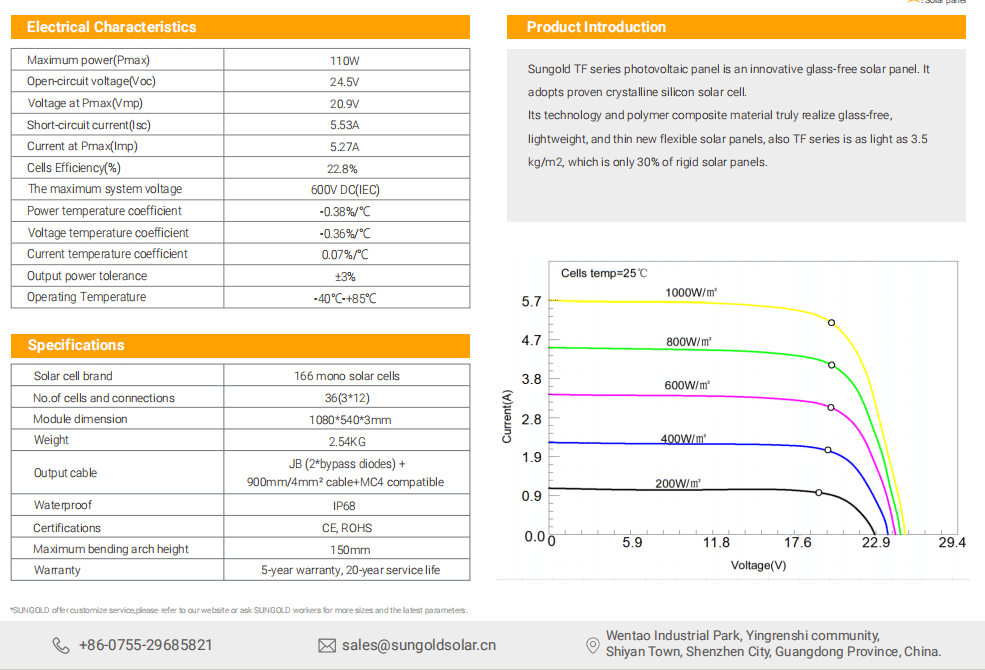
Solar Panel Power and Size
The power output of a solar panel is directly related to its physical size. Simply put, the larger the solar panel, the higher its power output. Even among panels of the same size, slight differences in the quality of the solar cells used can lead to variations in power output. For instance, a solar panel measuring 2279*1134 mm could have a power output ranging from 530W to 555W due to differences in quality.
Be wary of suppliers who provide panels with actual power outputs lower than advertised. This is a common tactic among some unscrupulous suppliers. For solar projects with limited space, determining the exact size of the solar panels during the project design phase is crucial to ensure the solar system fits the available space and meets the project’s energy requirements.
By carefully considering the power and size specifications of solar panels, you can make a more informed choice to meet your project’s needs. This will ensure that your solar investment delivers the expected efficiency and performance, maximizing the value of renewable energy to meet your energy needs.
Solar Panel Voltage
Solar panels come in various voltage options, including 6V, 12V, 18V, 36V, and 48V. The Voc (open-circuit voltage) listed on the specification sheet is usually higher than the nominal voltage. During the purchasing process, it is essential to ensure that the voltage of the solar panels matches the solar system they will be integrated with. For example, solar panels used for RVs or solar street lights are typically 12V and 24V, while those for high-power solar systems (solar power generation systems) are usually 36V or 48V.For a detailed reading of the 12Volt Solar Panels guide you can check out
Maximum System Voltage of Solar Panels
When planning the series configuration of solar panels, a crucial parameter to consider is the maximum system voltage. The total voltage increases with each additional panel in series, and the maximum system voltage limit determines how many panels can be connected in series.
Generally, brand-new Grade A solar panels come with a 15-year product warranty and a 25-year power output warranty. If a solar panel’s price seems unusually low, it might be second-hand or of inferior quality. Such panels may have actual power outputs far below the nominal value and a much shorter lifespan than the warranty promises.
Ensuring that the voltage of the solar panels matches your system requirements and being fully aware of the warranties and quality assurances provided are critical steps in the purchasing process. These considerations help protect your investment and ensure that your solar system operates optimally throughout its intended lifespan.
Six Considerations When Dealing With Chinese Solar Panel Manufacturers
Finding a reliable and legitimate solar panel manufacturer in China can be complex due to the large number of manufacturers and varying product quality. To ensure you select the most suitable supplier, follow these steps:
Conduct Thorough Research on Suppliers
Collect detailed information about potential suppliers, including company size, production capacity, year of establishment, sales data, main product lines, and market positioning. Build a list of potential manufacturers by continuously searching, researching, evaluating, and re-evaluating. Review suppliers across multiple platforms to gain a comprehensive understanding. Never rely on a single platform to make a decision. Once you have a list of suppliers, conduct an in-depth analysis of each one.
Screen Multiple Solar Panel Manufacturers
Avoid putting all your resources into one basket. If you have a large order volume, consider selecting multiple suppliers and backup options, even if you are satisfied with your current supplier. Unforeseen circumstances may arise, causing your current supplier to miss critical deadlines. Additionally, each supplier has its own strengths and weaknesses in terms of capacity, quality control, pricing, and after-sales service.
Gradually Establish Cooperations
Avoid engaging in large-scale cooperation with new suppliers initially. Start by testing samples and packaging. If the samples meet your standards, proceed with small trial orders. Only after verifying product quality and supplier reliability should you gradually increase the order size.
Verify Compliance with Regulations and Conduct Quality Inspections
Ensuring that the manufacturer you choose complies with all relevant safety regulations and quality standards is crucial. Inquire about their quality inspection processes to ensure that products meet safety and quality requirements. Research the quality standards for photovoltaic products in your country or region to confirm that the manufacturer meets all relevant benchmarks. These standards may include:
– International standards
– National standards
Ensure that the solar panels you purchase meet these standards to guarantee their performance, safety, and durability. The manufacturer should be able to provide documentation or certification proving that their products comply with these international and national standards.
Given the numerous standards, understanding or consulting with experts in the solar industry will be beneficial to ensure the correct application and interpretation of these standards in the context of your specific needs and regulatory environment.
Price Fluctuations
From 2021 to 2024, the prices of solar panel components have experienced significant fluctuations. In 2023, prices saw a notable decline from approximately $0.25 per watt to around $0.18 per watt. This significant price drop was mainly due to an oversupply in China’s solar supply chain and a global economic downturn, both contributing downward pressure on prices. Increased competition means that solar panel quotes are only valid for 2-4 weeks.
As of early 2024, solar panel prices are at historic lows. If you need to purchase solar panels or solar systems, now is an excellent time to contact Sungold (Contact Us).

